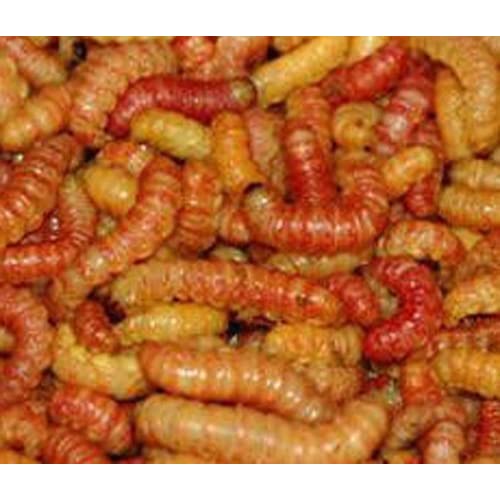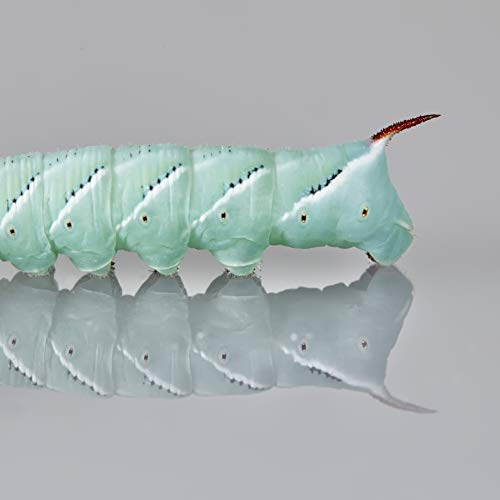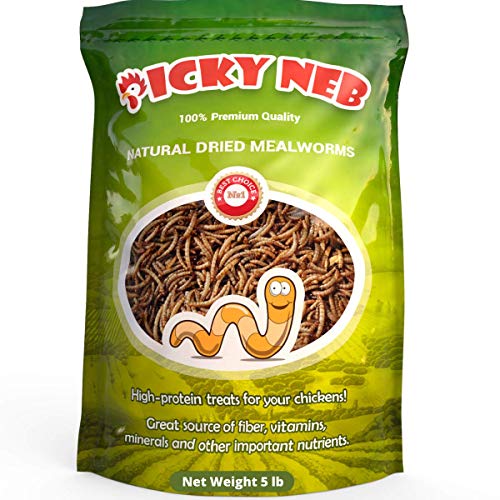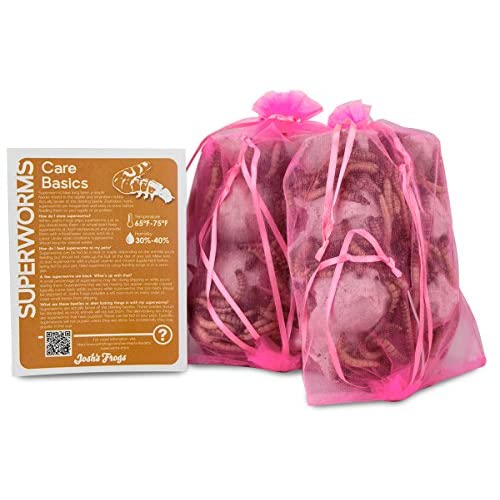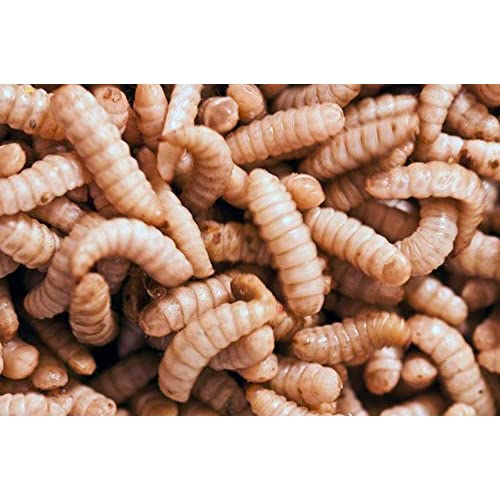Bearded dragons are equipped with the beard of spikes under their chins which can puff up depending on its mood. Among many kinds of pet reptiles (like anoles, skinks, iguanas…), bearded dragons are tending to be popular to have in our households because of their characteristics: gentle, active and inquisitive.
Our beardies originate from deserts in Australia and have been pets for less than three decades so there are endless lesson will be offered to their parents, like bearded dragons’ habitats, what is the best worms for bearded dragons or best types of worms for bearded dragons, etc…
Therefore, in this article, we will give you some guidance on the ways to care for, especially best feeder worms for bearded dragons due to their long-term health.
What Should Bearded Dragon Eat?
Bearded dragons are considered not picky eaters since they are omnivores so they can eat a wide range of live food such as small lizards, rodents, leaves. flowers, fruits and meat also. With strong jaws, they can easily clench and crush hard-shelled insects (beetles).
Beardies can eat meat in the form of insects and it makes up about 75% of their diet. Crickets, king worms, waxworms… are some types of insects in the live food list.
About fruits, our bearded dragons can consume nearly all such as kiwi, strawberry, melon… However, according to an exotic vet, soft fruits contain much sugar and can ferment and cause teeth problems. Therefore, beardies should be fed soft fruits about once a month to ensure that their fixed diet includes fibrous vegetables.
Here are some items that you can feed them occasionally: sprouts, tomatoes, pears, cucumbers… Remember to take the peel off and cutting it into pieces so your bearded dragons can consume easier. Greens, vegetables and fruits should make up about 20% to 25% of their diet.
Besides, providing enough water and a source of UVA/UVB light also requires a healthy growth to lengthen their lifespan.
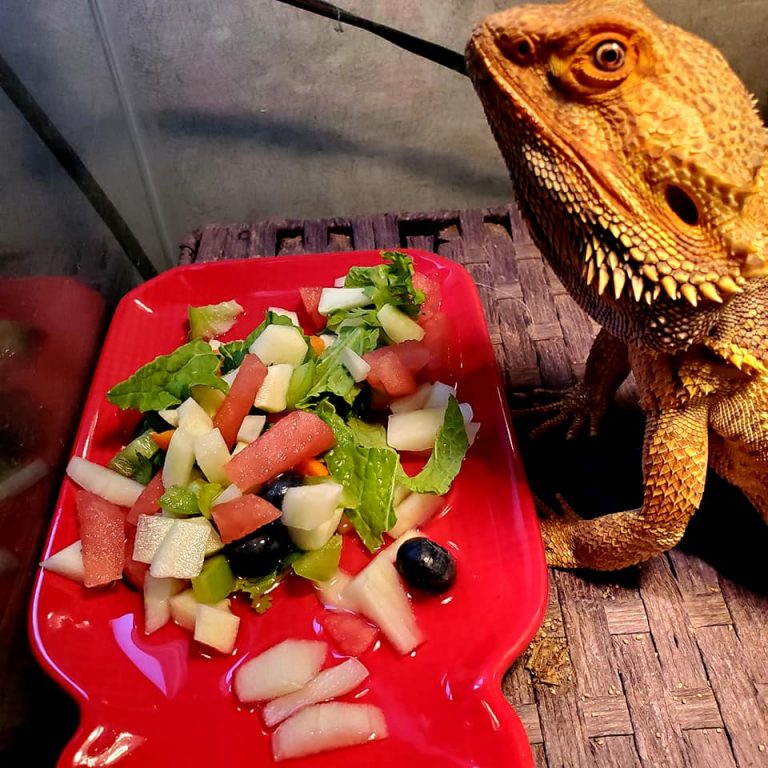
Top / Best Worms to Feed Bearded Dragon
After reading what I’ve written, I think you cannot deny the vital role of proteins, particularly insects or worms for the purpose of the healthy development of beardies. Be aware of this but how to choose what kind of worms for bearded dragons is another issue.
So in this part, I want to give some information about the best worms to feed bearded dragons to you – a pet reptile lover.
But first, you should know that the best insects to feed will contain a good amount of protein, calcium and other trace minerals to lengthen the lifespan of bearded dragons. You can use insects that be caught in the wild to feed your reptiles if they considered being safe.
Now let’s turn to the most anticipated part – best worms for a bearded dragon!
#1 Butterworms
These kinds of worms are also known as trevo worms that are a staple of the reptile diet. They have small size (one inch in length) but high nutrition for good proteins and high levels of calcium (moisture content: 58,5%; protein: 16%; fat: 5%; calcium: 87/100mg). It is the reason why it is called the best worms for baby bearded dragons (under 3 months old) because they need nutritious food in their diet.
Butterworms are often kept in the fridge for a long time before feeding beardies. Gut loading these worms are quite necessary as they provide more nutrition. Gut loading can be done with other live worms and insects too, not only butterworms.
You can find many brands of butterworms at reputable pet stores in town or online vendors. Elliot is also known as one of the reputable brands of live butterworms among bearded dragon lovers. Many customers review that even when the cold weather, all the butterworms are alive. It has great quality with fat shape and yummy taste for our beardies. Seem all the bearded dragons love them. However, Elliot’s butterworms cost high expense in comparison to other brands, this makes consumers consider a lot.
#2 Hornworms
Hornworms are a type of caterpillar that has large and soft body with a bright green color. The color is the most outstanding feature for you to distinguish hornworms and silkworms. It also can be a great stimulant of food response for the fussy bearded dragons who are fasting.
These worms can quickly grow up to 4 inches long so I will recommend it to adult bearded dragons. For baby bearded dragons, you’ll have to cut them into bites that allow your pet to eat easier.
They are one of the best type of worm for bearded dragons due to their nutrition they’ll give. They consist of 3,07% of Fat, 46.4/100mg of Calcium, 85% of Moisture and 9% Protein. A lot of owners often give them as a special treat or snack since they are a bit pricey.
When coming to the hornworms, it will be a regret if you don’t know DBDPet Live Hornworms. DBDPet has 4.1 stars out of 5 on Amazon because they are all active and very lush. They have an excellent starting size and rapidly growing to be full-size feeder worms for bearded dragons (adults). If you want variety in counts, order online should be the best choice.
#3 Mealworms
Mealworms are often supposed to be the best staple worm for bearded dragon, however, it is not the best worms for young bearded dragon because they have high in fat and low in protein. The mealworms nutritional content consists of 62% Moisture, 20% Protein, 13% Fat and only 13.3/100mg Calcium so it can lead to obesity and a slow growth speed if you feed too much. If using as a treat, our pet reptiles will definitely love their flavor and gobble them up.
This type can grow quickly to a length of about two inches and has a hard outer shell so they should only be eaten by adult beardies because the skin of mealworms is too hard for young and baby ones. Five to six mealworms per meal for an adult will be fine to avoid obesity. Don’t forget to follow the feeding schedule of a-year-old and above beardies I’ve said in the previous part.
PICKY NEB Dried Mealworms is the first brand of mealworms that you should take a look at. Unlike others, all the mealworms of PICKY NEB are non-GMO (non-genetically modified), preservative, safe for your pet reptiles. Moreover, this product can boost the immune system and improve health. Taking care of your bearded dragons through choosing high-energy, all-natural and fresh wholesome products like this is absolutely recommended. Seem they are dried so no refrigeration required and you can use and store easily due to the flexible package.
#4 Superworms
Superworms are considered a healthier version of mealworms with high level of protein and low level of fat, but there are still low in calcium. Their nutritional content is 20% protein, 13% fat and 12,5/100mg calcium
To feed juvenile beardies, the right length should be around 1.2 to 2cm long and 3.8 to 6cm long for feeding adult bearded dragons to ensure that they can digest more easily.
Remember mealworms and super worms are not the same with different level of protein and fat. However, both mealworms and superworms should only be fed as a treat once a week.
Josh’s Frog Superworms is always the best superworms for bearded dragons as many advices. It is a natural product and these superworms inside have a variety of slight sizes about 1 – ½ to 2 inches in length. This contains 500 superworms that can last along with your pet lifespan. You also should note that do not use them as your beardies’ staple food. Feeding them as treats or the improvement of the pet’s appetite level will be fine. Josh’s Frog superworms are not expensive at all and you can store it at room temperature then providing them with food/water source or with a vitamin and mineral supplement to strengthen your pet reptile health.
#5 Phoenix Worms
Phoenix worms (Black Soldier Fly Larvae) are such a great choice as best kind of worms for bearded dragon and their very small size makes them the best staple food for bearded dragon. They have a very high in calcium, protein and moisture also (43/100mg Calcium; 15.5% Protein; 68% Moisture; 8% Fat) and there is no need to gut load them. They are good for both juvenile and adult bearded dragons despite their different diets. Firstly, they have a low-fat content so you can use them as staple food for little beardies’ diets and are still suitable for adults to prevent obesity problems. You don’t need to gut load them and use them as soon as you take it from store to home.
10 to 15 worms a meal can be fine to feed our pet reptiltes, the best way to offer them is placing in a shallow bowl, beardies will never deny.
If you want to find where to buy this kind of insect and what is the best in this large scale market, I would recommend Animal Specialties Black Soldier Fly Larvae on Amazon. These worms of this brand provide essential vitamin B and the two elements on top of magnesium (iron and sodium). 100% of worms are alive when they arrived. Moreover, there are many compliments for the high-quality package so don’t be worry about the delivery.
What is Bearded Dragons’ Proper Feeding Procedure?
Feeding procedure is an important part of your bearded dragon’s care if you want your pet to avoid obesity and health issues. Here is some summarized information you should know.
#1 For Baby Bearded Dragons
Like the way we raise our babies, there is a marked difference between diets for adults and baby bearded dragons – under 12 months old.
For below-three-month-old beardies, they should consume about 70% rich in protein (insects – to find the best worms for juvenile bearded dragons, please check the next part) and 30% left for processing salad. The salad here means vegetables and soft fruits. They can be fed at least three times a day.
For bearded dragons aged least 3 to 8 months old should have a meal that balances salad and protein (50 – 50) because, at this age, obesity can catch up and cause health problems for our pet. So they should be given less than 3 meals a day to support their vigorous growth and development.
What about the above 8 month-old to 12 month-old beardies? They also should be fed a diet that consists of 50% salad and 70% protein once a day to help monitor their weight.
Please make sure that you choose insects which smaller than space between the young bearded dragon’s eyes and remember to cut down the fruits into bite-sized pieces.
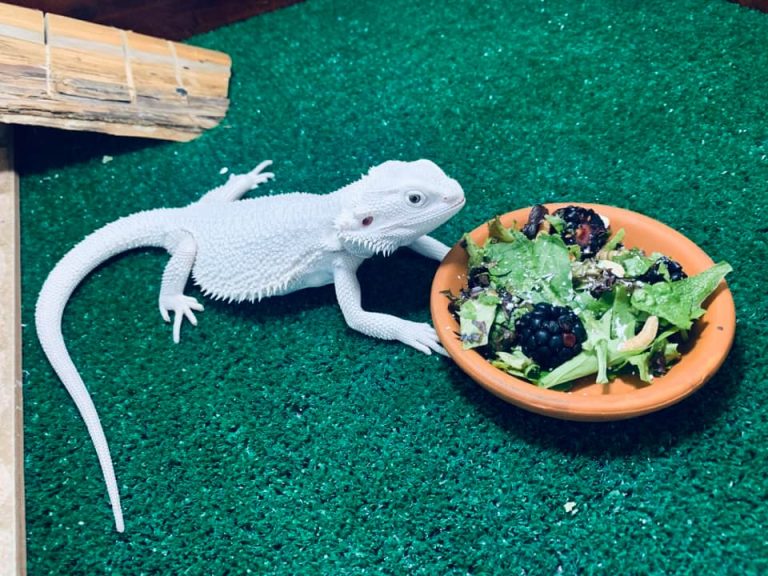
#2 For One-Year-Old and Above
For a bearded dragon that ages more than a year old, its diet is completely opposite to the younger one: 30% protein and 70% salad. This means you should provide more fruits and veggies and fewer insects. There has a limit of insect consumption that is at least 30 worms or 50 roaches/crickets a week to support their normal growth.
Their feeding schedule should be: Once meal a day
One day of fruits and veggies.
One day of proteins (insects or worms).
One day of nothing to call it a day.
If you pamper your beardies too much with more proteins and multiple meals in a day, that would inevitably cause obesity. You should reduce the amount of meat as soon as possible because your pet reptiles will not have as much exercise as his wild cousins.
Besides protein and salad, there are some kinds of food you should list on the diet:
Calcium: As I mentioned above, your pet will not have a strong body like his wild cousins so it is necessary to add a calcium supplement twice a week.
Packaged food: Nowadays, commercial foods are available in high or low protein level for juvenile lizards or adult bearded dragons.
Clean water: Don’t forget to fill water to your beardie’s cup because this can help to support its healthy growth.
Conclusion
To take care of nutritious meals to safe homes for bearded dragons will not be really easy for some new parents. After reading this article, I hope you will finally choose the best worms for a bearded dragon that you are raising. Remember to follow the exact diet procedure of your pet reptiles as I’ve said above (depending on their ages) to strengthen their health situation.
